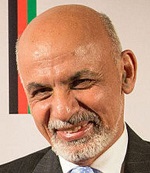
Ashraf Ghani
Ayesha Tanzeem
VOA News
February 18, 2020
ISLAMABAD – Five months after Afghanistan’s presidential election, the country’s top electoral body Tuesday declared incumbent President Ashraf Ghani a winner for a second term while his top rival Abdullah Abdullah’s team called the decision “illegal.”
The Independent Election Commission of Afghanistan said Ghani won 50.6 percent of the votes cast while Abdullah had 39.5 percent, which fell in line with the preliminary results announced in December.
“This announcement is unacceptable. We stand against it. We will use all options on the table,” Faridoon Khwazoon, the spokesman of Abdullah’s election, team told RFE / RL’s Pashto language Radio Azadi.
Days earlier, Abdullah’s supporters, including General Abdul Rashid Dostum, the first vice president of Afghanistan and a key political figure in the northern parts of the country, warned of setting up a parallel government if the commission announced what they said were fraudulent results.
Calling the elections “historic,” the head of IEC Hawa Alam Nuristani announced that 31.5 percent of the total turnout of 1.8 million voters were women.
She also said her commission implemented all of the decisions taken by the Independent Election Complaints Commission, including carrying out a partial recount of 300,000 disputed votes.
The results of the election held in September of last year were repeatedly delayed due to technical issues, allegations of fraud, and protests from candidates. After the announcement of preliminary results in December, thousands of complaints were filed with the Independent Election Complaints Commission triggering audits and recounts.
With just over 50 percent of a total votes cast, Ghani has less than a million votes to his credit in a country of an estimated 34 million. Around 10 million registered to vote in this election.
The results come days ahead of an expected deal between Taliban and the United States that could pave the way for the U.S. to withdraw its troops and end its longest ever war.
The deal is also expected to lead to the start of formal negotiations between Taliban and a representative group of other Afghan factions, including women and civil society activists.

